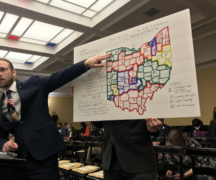State Reps. Thomas E. West, D-Canton, and Susan Manchester, R-Waynesfield, unveiled legislation last week they say would cut out-of-pocket prescription costs for patients.
Patients with chronic, complex conditions such as multiple sclerosis and hemophilia rely on copay assistance programs through organizations like drug manufacturers, charities, and churches to help cover the costs of their prescription drugs, a release said.
Recently, the release said, many major health insurance providers have implemented discriminatory policies that no longer allow payments made through these copay assistance programs to count toward a patient’s deductible.
Patients can be often blindsided by the discriminatory policies and end up owing thousands of dollars because of unmet deductibles, it said. Additionally, insurers get paid twice for the same medications, meaning they pocket the assistance payment from a manufacturer or church, as well as any copays from the patient during the deductible phase, the release said.
House Bill 469 protects patients and reduces their out-of-pocket prescription drug costs by prohibiting these discriminatory policies and allowing aid from copay assistance programs to count toward a patient’s deductible, it said.
“The rising cost of prescription drugs is one of the greatest challenges we currently face. House Bill 469 is a critical step towards reversing that trend by ending these unfair practices and ensuring greater access to the lifesaving drugs Ohioans desperately need,” said West.
“These policies discriminate against patients with chronic conditions, as well as those who need innovative prescription drugs for which no generics typically exist,” said Manchester. “House Bill 469 fights to cut out-of-pocket prescription drug costs for our families.”
The release said House Bill 469 would have a lasting effect on patients with rare diseases, saving them thousands of dollars on prescription costs.
“Similar legislation has been passed in West Virginia, Virginia, Illinois and Arizona,” said Manchester. “It’s time we add Ohio to that list.”





